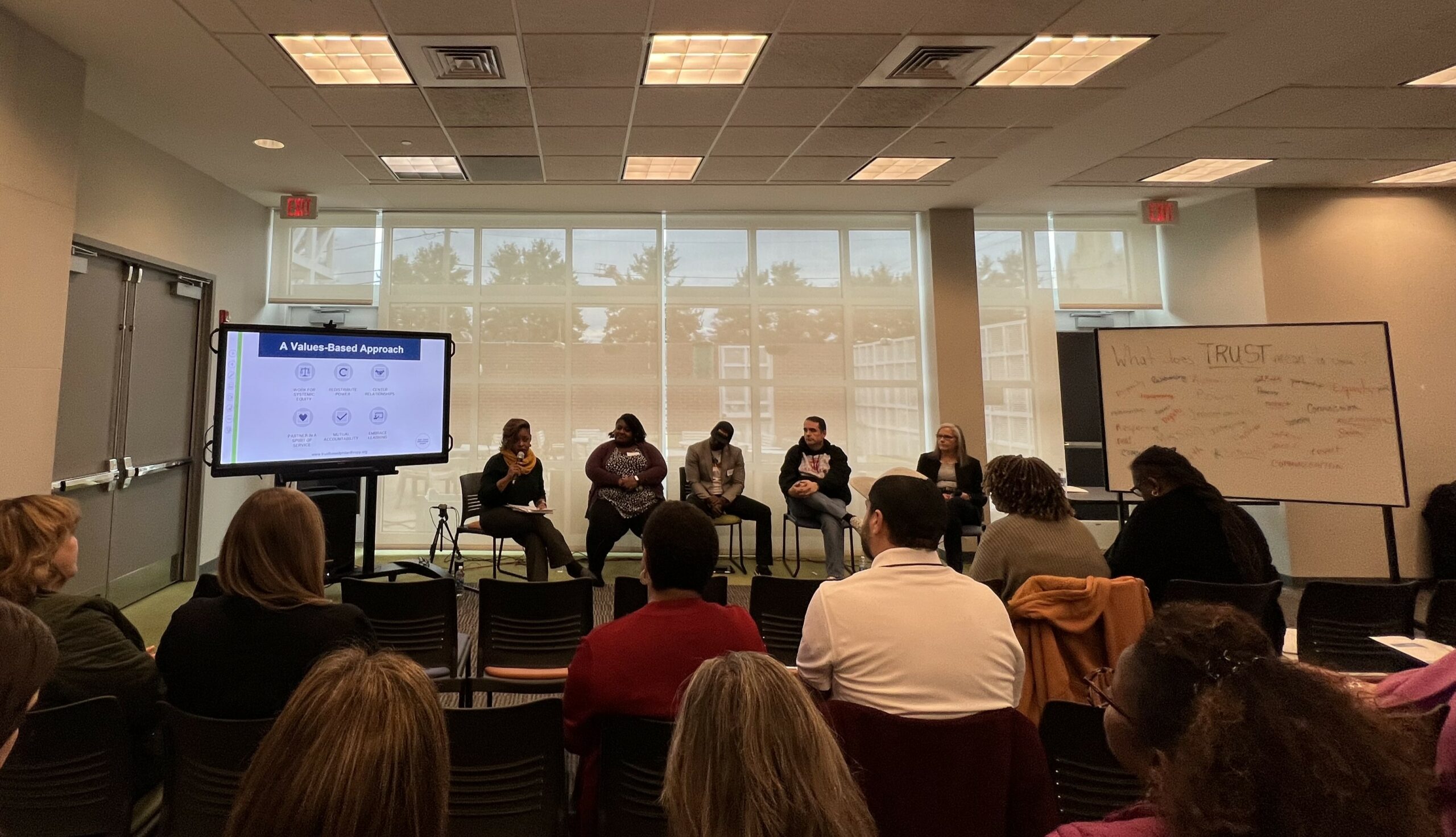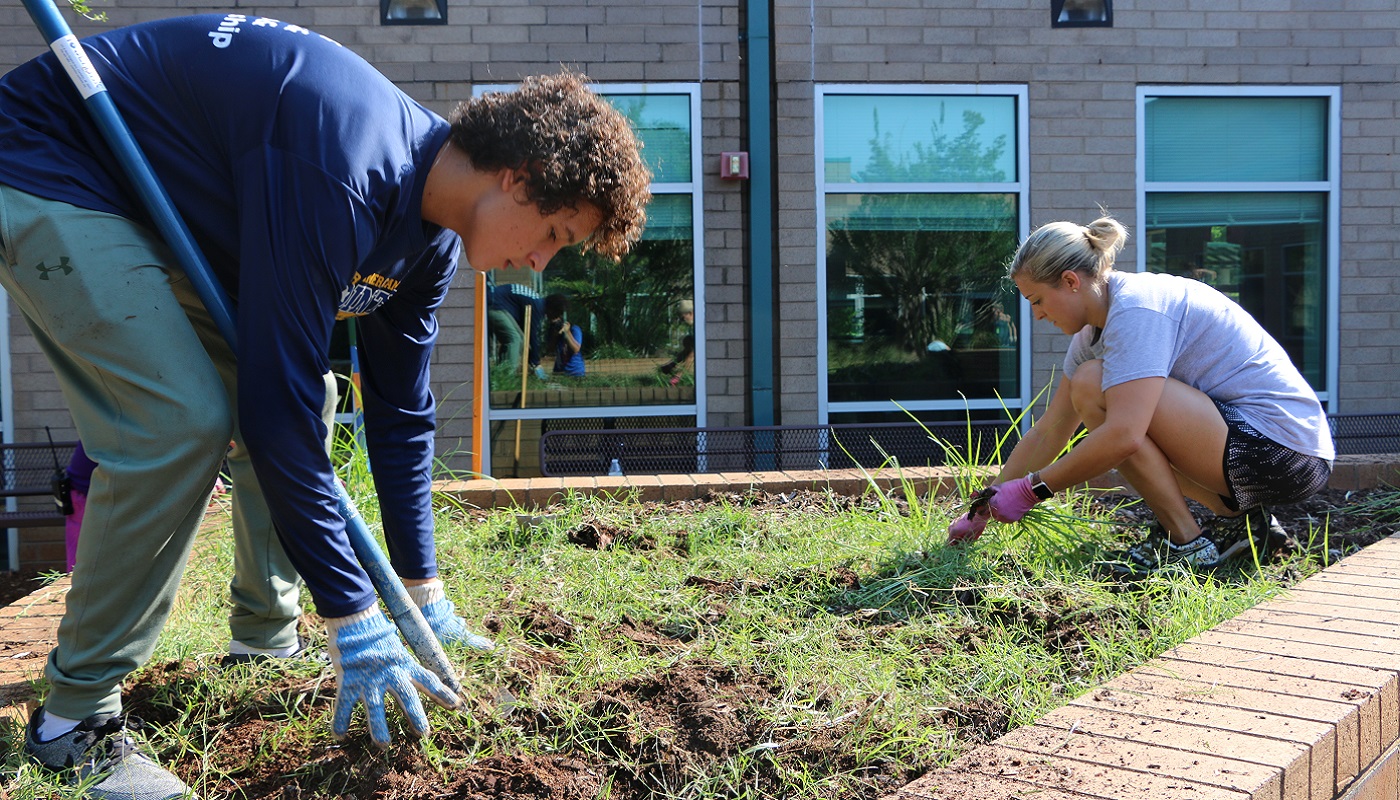
Embracing Trust-Based Philanthropy to Create Change
In this article, we will define trust-based philanthropy, why it is needed to create real change and how you can see it showing up in our community.
When thinking about building relationships, there are key attributes that come to mind: communication, honesty and authenticity. While these are all essential to relationships, it is trust that will transform a connection into something stronger.
Trust is the invisible string that ties together every interaction, a catalyst that turns a new partnership into a meaningful relationship. Trust-based philanthropy recognizes that authentic connections, built on trust, are the foundation of sustainable and impactful change, proving that the power of philanthropy extends beyond financial support; it evokes shared understanding and mutual respect.
United Way of Greater Charlotte’s Chief Impact Officer Kathryn Firmin-Sellers participated on a panel facilitated by Erika Troutman (Historic Westend Partners) and Janeen Bryant (Community Building Initiative), and hosted by Allegra Westbrooks Regional Library, discussing the misconceptions and doubts surrounding trust-based philanthropy.
Firmin-Sellers, along with fellow panelists John Brothers (T. Rowe Price Foundation), Jamall Kinard (Lakeview Neighborhood Alliance) and Chantias Ford (Trust-Based Philanthropy Project), talked through the meaning of trust-based philanthropy and highlighted the importance of using trust-based philanthropy as a tool for true social impact.
What is trust-based philanthropy?
Trust-based philanthropy is a charitable approach that reimagines the relationships between donors, nonprofits and communities to rebalance power and decision making. Trust-based philanthropy is not entirely new; it’s one outcome of years of debate within the world of philanthropy between donors, nonprofits, activists and academics. At its core, it is a partnership model between funders, nonprofit organizations, practitioners and communities that acknowledges the unique needs and capacities of all stakeholders.
John Brothers, President at T. Rowe Price Foundation, stated that trust-based philanthropy is an ongoing movement, comparing it to wellness. Just as there is no immediate, one-time fix to a lifetime of wellness, there is no immediate, one-time fix to support communities in need. There are many factors involved in the process, you have to be committed to the goals and you have to have consistency in order to see progress.
“The idea is that every day is an ongoing effort for us to figure out what stops us from having a true relationship with the local community,” Brothers said.
“It’s an ongoing effort of looking in the mirror and using the things that we’re creating to help us make sure, ‘are we better today than we were yesterday?’ And ‘what are the gaps that we have right now that we have to continually get better at?’ And there are a lot of things that we’re doing wrong every day that we’re trying to get better at.”
Brother also noted that before joining the trust-based philanthropy movement, you have to recognize any damage you’ve caused in a community or to residents before going in to create change. Reconciliation is necessary to build trust with community leaders and nonprofits.
After you reconcile, you need to start listening, and you must be mindful of how you listen to community leaders and nonprofits. What do residents want to see in their community? How do they want decisions to be made? By opening up this line of communication, you can begin working together for change.
Why is it needed?
Traditional giving has contributed to systemic inequities in the past, by how funds are distributed and also how funds are controlled. Trust-based philanthropy redistributes power back to residents, community leaders and nonprofits who are closer to the issues being addressed, resulting in stronger, healthier and more equitable communities.
Trust-based philanthropy emphasizes unrestricted, multi-year grantmaking. An unrestricted gift is a contribution given without any specific restrictions or conditions. In contrast, a restricted gift is earmarked for a particular purpose, program or even line-item expense.
Chantias Ford, Program Director at Trust-Based Philanthropy Project, outlined grantmaking practices of trust-based philanthropy before the panel discussion.
“When a nonprofit is figuring out how to pay staff or keep lights on, that takes away from getting the actual work done,” Ford said.
Restricted funding will not pay foundational essentials; it will only cover what a funder deems essential, which includes things like a direct service staff, but not an organization’s executive director or its finance department.
Unrestricted, long-term funding provides organizations with stability and longevity, enhances their impact, encourages responsiveness and accountability to the community and supports creativity and innovation within an organization.
What does trust-based philanthropy look like across the nation?
Many funders are embracing trust-based philanthropy, and the Trust-Based Philanthropy Project outlined a set of values based on a company’s culture, structures, practices and leadership.
From Trust-Based Philanthropy Project:
The following values have been central to the work and approach of a range of trust-based funders:
- Work for systemic equity: Recognize the racial, economic, and political inequities in which we operate, and take an antiracist approach to change practices and behaviors that perpetuate harm.
- Redistribute power: Be willing to share power with grantee partners and communities who are closer to the issues we seek to address.
- Center relationships: Prioritizing healthy, open, honest relationships can help us navigate the complexity of our work and our world with greater confidence and effectiveness.
- Partner in a spirit of service: Be a supporter and collaborator, rather than dictating what is needed. Lead with trust, respect, and humility.
- Mutual accountability: Our work will only be successful if we hold ourselves accountable to those who we seek to support.
- Embrace learning: We can only advance impact if we remain open to learning as we go, and embrace opportunities for growth and evolution along the way.
When a company is clear on its values it allows for internal alignment among staff and the board, helping guide their community investments.
As more funders and grantmakers adopt trust-based philanthropy and multi-year funding, there is an increase in funded nonprofits feeling safer and more supported, a concept Ford described as “psychological safety.”
Trust-based philanthropy is working and becomes real when grantees feel and experience a shift in power when working with a funder.
What does trust-based philanthropy look like in greater Charlotte?
“It starts with building relationships, truly listening to what people want and what people need, and what they want is a seat at the table,” Firmin-Sellers said, “What we’ve been doing at United Way is building a space where we are working in true partnership with our nonprofits, and really giving them a seat at the table in our decision making.”
An example of trust-based philanthropy in Charlotte is the partnership between United Way and Lakeview Neighborhood Alliance through the United Neighborhoods initiative that began in early 2022. Through this initiative, United Way offers flexible, multi-year, unrestricted grant support to community quarterbacks, such as Lakeview Neighborhood Alliance. Quarterbacks engage residents and community leaders to identify support services and recommend funding for nonprofits serving their neighborhoods. In addition to operational funding, United Way provides training, resources and convening opportunities for agencies to grow capacity, strengthen leadership and build resiliency.
This continued partnership has been successful due to mutual respect and accountability for both United Way and Lakeview, which can only be achieved after curating a meaningful relationship.
“At the end of the day, what I value more than anything else in the world is the relationship I have with a nonprofit partner,” Firmin-Sellers said.
Firmin-Sellers and Kinard have been able to learn from one another over the past few years, and their collaboration has resulted in stronger relationships, innovative strategies, effective communication and increased engagement with residents. United Way’s nonprofit partners are empowered to provide Firmin-Sellers with real, honest feedback about their experiences, holding United Way accountable for its support and actions as a funder.
Jamall Kinard, Executive Director at Lakeview Neighborhood Alliance, knows the importance of holding each other accountable as well, but also knows it isn’t easy at first, and it requires a lot of teamwork.
“I think it’s hard to talk about accountability if you don’t believe in the possibility of what people can do when you bring them together to come up with a strategic plan or a plan of action for their community,” Kinard said.
Kinard also believes that in order for trust-based philanthropy to work, there needs to be trust not only between the funder and grantee, but also among the nonprofits working together in a community. When nonprofits work collaboratively instead of in competition, there is much more progress made.
Why switch from traditional funding to trust-based philanthropy?
When talking about ways to promote trust-based philanthropy to donors, Brothers compared it to stock investments; when you make an investment in a company, you are not dialing in to just one part of that company.
“When you invest in Coca-Cola, are you only investing in Diet Coke? No, why would you do that? You would invest in the company as a whole,” Brothers said.
If you ask someone to prove that restricted funding is the better route to take, you will not get an answer. By investing in an organization as a whole, you are providing a wealth of opportunities for that organization to grow and increase their impact in your community. As stated earlier, unrestricted funding allows organizations to focus on their work and impact, not keeping the lights on.
There are a number of long-term benefits associated with trust-based philanthropy for both the funder and grantee, including:
- Increased knowledge about barriers and accelerators in the community
- Stronger, more honest and transparent relationships with community leaders, residents and nonprofits
- Nonprofits are able to scale their impact in new ways over time
- Staff and Board members gain a deeper connection to the work
If you want to be a part of true change in your community, trust-based philanthropy is the path forward. By engaging with and listening to residents and community leaders, you are able to connect with the work on a deeper level and find more meaning in it, rather than just cutting a check and moving on.
Trust-based philanthropy is not a checklist; once you begin the relationship, you must commit to the ongoing partnership and lean on each other as you reach your goals together.
Join the movement.
When you give to United Way, you are investing in initiatives that provide local nonprofits with the tools they need to be sustainable and create a lasting impact.
Interested in getting your company involved? Invite United Way to talk to your CSR leaders to help guide your community investment. Email donorrelations@unitedwaygreaterclt.org for more information.
Interested in ways YOU can get involved?
- Give. Make a gift that helps 132 agencies keep the lights on and supports their mission.
- Advocate. Follow United Way on Instagram or sign up for our newsletter to learn more about our work and the nonprofits we support.
- Volunteer. Take action and sign up for one of our four signature volunteer events or organize a project with friends, family or coworkers.




